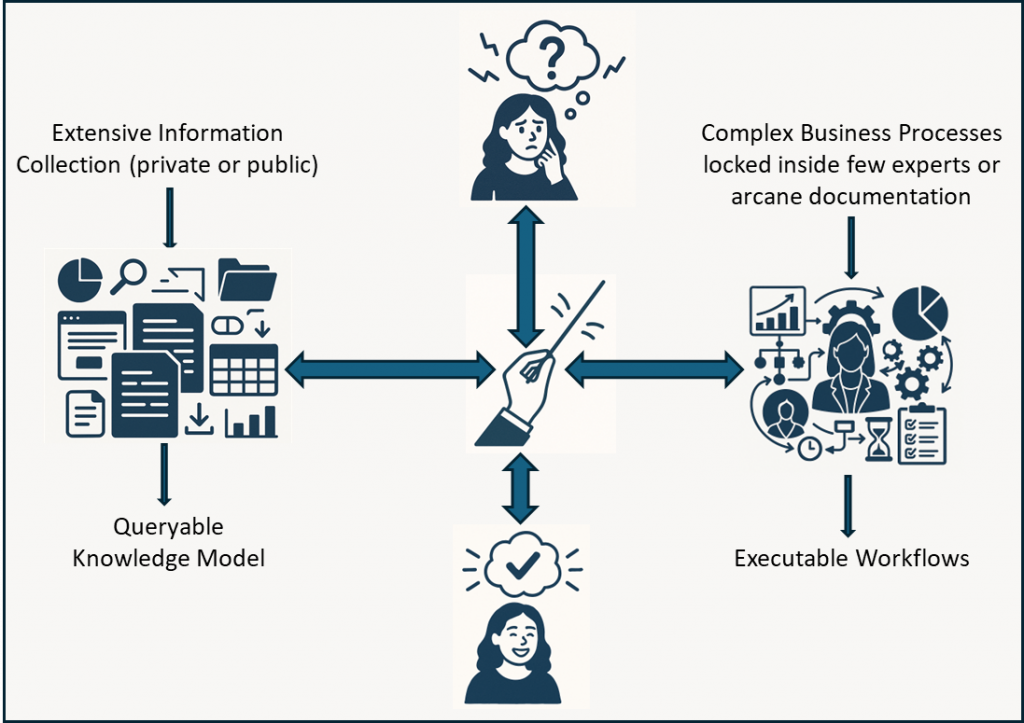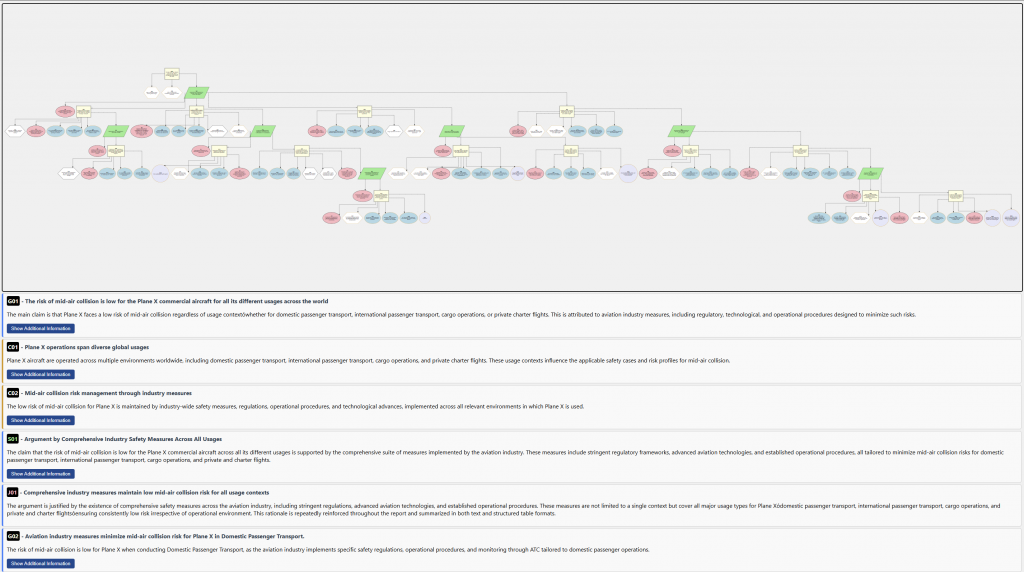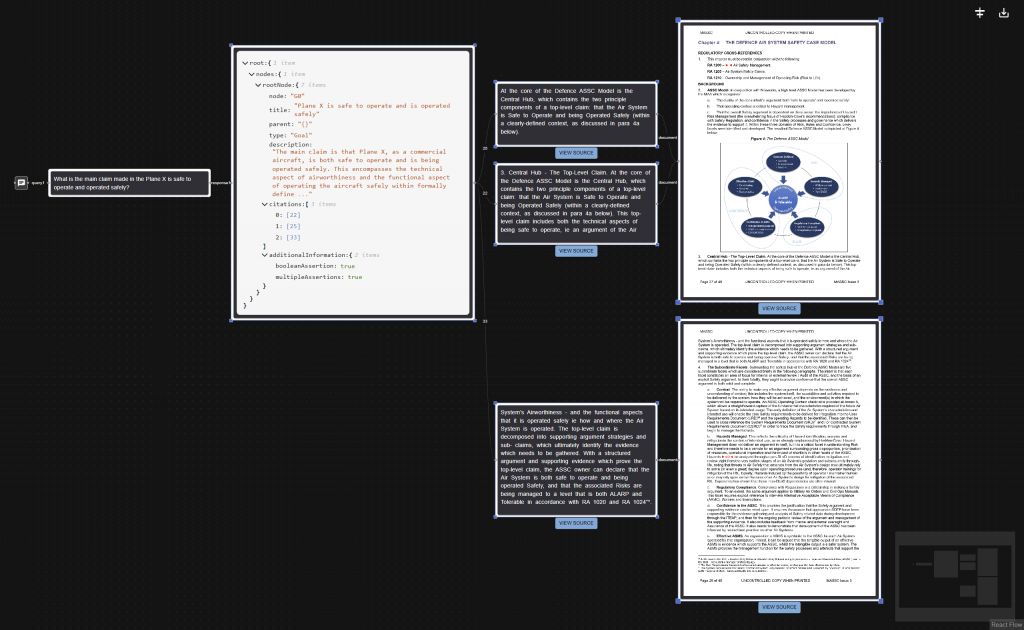
THE PROBLEMS
“As AI becomes more powerful, it faces a major trust problem. Consider 12 leading concerns …
“AI’s TRUST PROBLEM”, HARVARD BUSINESS REVIEW, 3 MAY 2024
Each of these issues is complex — and not easy to solve.”
“AI models are becoming far less important than the apps that harness them. However, building custom apps using AI models is just too hard for most businesses right now.”
“2025 is the Year of the AI App”,
The Information, 14 January 2025

OUR SOLUTION
Dedoctive brings discipline, trust, and auditability to agentic AI,
by wrapping any Large Language Model to deliver outputs with full confidence and accountability.
Dedoctive reads huge volumes of complex information, organises it intelligently, thinks through difficult problems step-by-step, and produces professional-grade structured analysis – with full traceability to the original sources.
HOW IT WORKS
- Curated knowledge models ensure responses draw only from validated information and meet all GOV.UK Data Quality Dimensions.*
- Hybrid workflows designed visually in BPMN embed AI reasoning within transparent, compliant processes.
- Granular provenance hyperlinks trace every source, even down to individual table cells or background text in an image.
* correct, complete, consistent, current, concise, and checkable
The result? Our Trustworthy AI Navigators tell:
The truth.
Dedoctive Navigators obtain answers using specialist multi-step workflows created by human experts. Each part of an answer includes hyperlinks into expert-verified sources. Links take you directly to the key details, which could be background features of an image or items in a table. Dedoctive then lets you discover related information.
The whole truth.
Dedoctive identifies the deep connections linking information items, even those that seem unrelated. You can then use interactive visuals to analyse arguments and explore their context. This makes hidden knowledge and new opportunities available to you.
And nothing but the truth.
Dedoctive provides only the knowledge most relevant to your question. This gives you better answers and faster performance, for a lower cost. All answers are drawn from verified, reliable sources – and if no answer is available, Dedoctive will say so. Dedoctive does not hallucinate.
OUR IMPACT
With the aid and purpose-based support of government / charitable grants, we are building trustworthy AI Navigators in partnership with industry stakeholders to help communities everywhere respond to emerging threats – with a particular focus on the existential challenge of our age, climate change.
- PROTECT: Ensure that adoption of new technologies keeps risks as low as reasonably practicable and empower effective humanitarian response to crises
- Safety Navigator helps ensure that technologies employed to address climate change and other issues are safe to operate and operated safely, by highlighting weaknesses and omissions in safety cases for complex systems.
- As part of SIREN (Safety & Incident Response for building Emergency Networks), we are developing RouteMAIT to empower disaster responders by providing swift and effective routing for debris clearance, casualty transportation, wildfire suppression, search and rescue, and relief aid distribution.
- Crisis Navigator [forthcoming] will help cities and regions minimize the effects of disasters before they occur, by fusing data feeds and applying simulations from an open-source library into an AI-enabled digital twin that enables predictive situational awareness.
- PREPARE: Develop the human skills capacity needed to make homes and other buildings greener and healthier
- Retrofit Navigator helps architects, builders, and homeowners upgrade homes and other buildings for the 21st century, by providing everything they need to know about the holistic new construction practices of Whole House Eco-Retrofit.
- Green Skills Navigator [forthcoming] will help people (e.g., those whose jobs are threatened by AI) find fulfilling and rewarding work locally, by providing personalised pathways into green jobs, highlighting opportunities with local employers, directing workers towards suitable training services, and helping trainees obtain supportive funding.
- Learning Navigator [forthcoming] will help build the capacity needed in critical areas such as green skills, by enabling training and certification providers to assemble reference materials flexibly, make them easily accessible to students, and semi-automate assessments.
- PROVIDE: Help communities create the infrastructure necessary to respond effectively to climate change and support their most vulnerable members
- Place Navigator helps developers and communities ensure that planning applications align with modern community- and wellness-oriented placemaking, by helping review applications for compliance with best practice local and national guidelines.
- Adaptation Navigator [forthcoming] will share strategies for grass roots climate adaptation and provide communities with customised pathways to adoption.
- Climate Navigator [forthcoming] will massively reduce the time required to adopt climate adaptations and mitigations, by semi-automating the creation of investment-ready projects that address the impacts of climate change and turn them to advantage.
We also build custom AI Navigators for organisations to help their staff access information flexibly at point of need, publish effectively to stakeholders, and more.
Get started
- Build, debug, and deploy AI workflows. Download Dedoctive Developer Edition, the free IDE for open-standard, transparent AI workflows that combine agentic and deterministic processing (official video tutorial series for Dedoctive Developer Edition).
- Build your own trustworthy AI Navigators. Construct multiply-indexed knowledge models that make AI-based responses correct, complete, consistent, concise, current, and checkable. Tell us about the information you want to unlock (documents, data, websites, intranet, or other content) and we’ll show you how a trustworthy AI Navigator can help.
- Become a Dedoctive channel partner. Our trustworthy AI Navigators are delivered by channel partners of Collaboration Tools Ltd. Dedoctive channel partners collaborate in a Supercommunity, working together to build synergy, develop new opportunities, and increase the value they collectively offer to customers.
Our trustworthy AI Navigators keep your data safe
- Dedoctive uses best practice security protocols to protect your information and ensure confidentiality. We are certified with Cyber Essentials.
- Information provided to you by Dedoctive is stored securely in your chat history. You can retrieve this at any time to resume where you left off, and delete it when you wish.
- If required, we can provide on-premises / private cloud solutions or an automated redaction mechanism that ensures no information is ever transmitted openly to cloud services.
Meet Us
OUR MISSION
We believe that social and economic challenges can be addressed by showing communities of all sizes and types how to become antifragile.
Supercommunities face each new challenge by restructuring – changing the use of capitals and assets to improve outcomes for members, their environment, and their descendants.

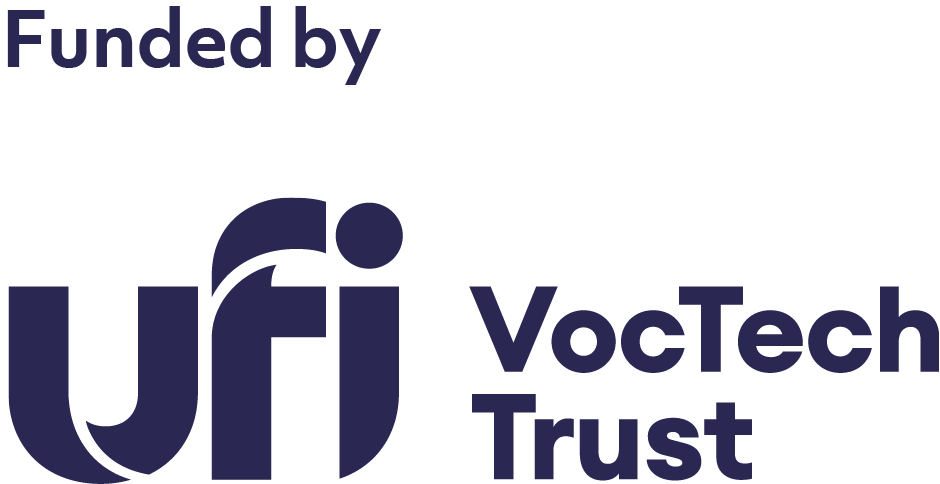

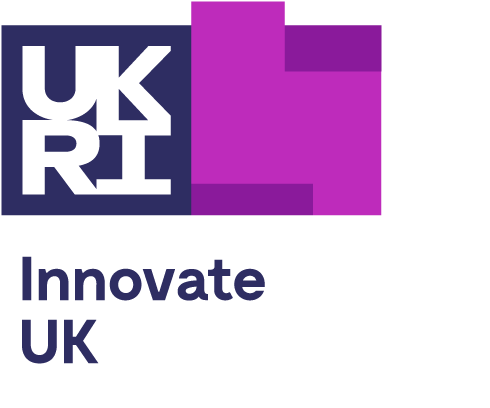
Founders
Meet the founders of Dedoctive.

Keith’s Blog
Keith discusses how Dedoctive powers trustworthy AI Navigators to enable the Internet of Communities.
Keith Harrison-Broninski
Chief Executive Officer
Keith Harrison-Broninski is a technology thought leader who gives keynotes and lectures to business and academic audiences worldwide.
Keith’s 2005 book “Human Interactions” set out the first formal theory of collaborative work processes.
“Set to produce the first fundamental advances in personal productivity since the arrival of the spreadsheet”, Information Age
Keith’s 2021 book “Supercommunities” set out a similarly ground-breaking theory of antifragile communities.
“Read this book!”, from the foreword by Vint Cerf, Co-Inventor of the Internet
“A fascinating, eclectic and powerful call for us to rebuild society from the bottom up. Ranging from ancient history to economics to psychology to public policy ‘Supercommunities’ is both authoritative and highly readable”, from the foreword by Matthew Taylor, then Chief Executive, The Royal Society of Arts, Manufactures and Commerce
As an entrepreneur, Keith has created award-winning health and wellness platforms for cities and led technology-based transformation programmes for governments.

Peter’s Blog
Peter discusses how Dedoctive provides the AI necessary to engineer trustworthy solutions.
Peter Lawrence
Chief Technology Officer
Peter Lawrence is a passionate and innovative senior technologist who delivers transformational solutions to strategic technical challenges at enterprise level.
Peter has founded and led several startups as CTO.
At Matrikon, which was acquired by Honeywell, Peter led all software and information technology developments, transforming the software platform from an expensive-to-maintain legacy system to a Lean system focusing on added-value and utilizing third-party technology where possible.
Peter also transformed the development processes from traditional but inefficient waterfall development to Agile methodology.
Before that, as President and founder of Resolution Integration Solutions, Peter led the creation of Resolution, an innovative database model application for the process manufacturing industries.
Other positions Peter has held included Director of Technology at Morrison Knudsen, Vice President at KBC Advanced Technology, Technical Director and founder of KBC Process Automation, and a founder of Process Automation and Computer Systems Ltd.

